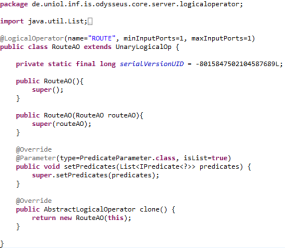...
Physical operators are divided into operators that add data to the systems (sources), remove data from the system (sinks) and process data (pipes). In a more query plan like view, the sources are operators with no input but with output port, the sinks are operators with only inputs ports and the pipes are both sources and sinks. Odysseus provides basic implementations for sources (AbstractSource), sinks (AbstractSinks) and pipes (AbstractPipe) that must be used to create own operators. The abstract implementations provide most necessary common processing code to concentrate on special processing for the concrete operator. In the following we will demonstrate the creation of a simple route operator, that routes data tuples to different output ports depending on some predicates. The physical operators are connected by a subscription.
TODO: Interaction between sources and sinks
...
First, you need to decide if you want to place the operator in a new OSGi bundle or in an existing one. Independently of that, the operator must be placed in a bundle ending with logicaloperator if it should be integrated automatically.
To create your own logical operator you need to extend AbstractLogicalOperator (which implements ILogicalOperator). For convenience reasons there are base implementations for operators with single input (UnaryLogicalOp) and binary input (BinaryLogicalOp). As a naming convention, the class name should end with AO (for algebra operator).
This class must provide (at least) two constructors and the clone method. The default constructor is required as instances of logical operators are created by newInstance(). Clone must call the copy constructor and the copy constructor must call the super copy constructor! If at runtime an error like "has no owner" is called, in most cases this is because of the missing call to the super copy constructor.
Finally, the class needs setters and getters for the parameter it should keep.
| Code Block | ||||||||||
|---|---|---|---|---|---|---|---|---|---|---|
| ||||||||||
/********************************************************************************** * Copyright 2011 The Odysseus Team * * Licensed under the Apache License, Version 2.0 (the "License"); * you may not use this file except in compliance with the License. * You may obtain a copy of the License at * * http://www.apache.org/licenses/LICENSE-2.0 * * Unless required by applicable law or agreed to in writing, software * distributed under the License is distributed on an "AS IS" BASIS, * WITHOUT WARRANTIES OR CONDITIONS OF ANY KIND, either express or implied. * See the License for the specific language governing permissions and * limitations under the License. */ package de.uniol.inf.is.odysseus.core.server.logicaloperator; import java.util.List; import de.uniol.inf.is.odysseus.core.predicate.IPredicate; import de.uniol.inf.is.odysseus.core.server.logicaloperator.annotations.LogicalOperator; import de.uniol.inf.is.odysseus.core.server.logicaloperator.annotations.Parameter; import de.uniol.inf.is.odysseus.core.server.logicaloperator.builder.PredicateParameter; @LogicalOperator(name="ROUTE", minInputPorts=1, maxInputPorts=1) public class RouteAO extends UnaryLogicalOp { private static final long serialVersionUID = -8015847502104587689L; public RouteAO(){ super(); } public RouteAO(RouteAO routeAO){ super(routeAO); } @Override @Parameter(type=PredicateParameter.class, isList=true) public void setPredicates(List<IPredicate<?>> predicates) { super.setPredicates(predicates); } @Override public AbstractLogicalOperator clone() { return new RouteAO(this); } } |
Every operator needs to provide an output schema, i.e. what is the schema of the elements that are produced. As a default implementation AbstractLogicalOperator delivers the input schema as the output schema. Route does not change the input schema, so this implementation is sufficient. If the input schema is not the same as the output schema, the class needs to implement getOutputSchemaIntern(int port), where port is the output port of the operator.
...
